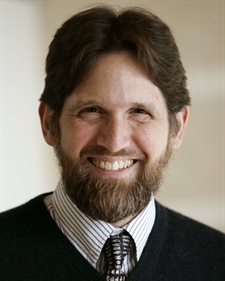“Because you are an interesting person, you will find something interesting in whatever you choose,” said Peter Peregrine, who has taught anthropology at Lawrence University for the past 15 years. He called the statement his “tagline” – the advice he often gives to students as they embark on independent study projects.
 Peter Peregrine will serve as Faculty Coordinator for the fall 2011 ACM India Program.
Peter Peregrine will serve as Faculty Coordinator for the fall 2011 ACM India Program.
“There is this mindset among students that if they do not choose the right project topic, they won’t be successful at it,” he continued. “What I keep saying is, ‘No, you will be successful because of what you bring to the project. The topic is not going to create the project. You are going to create the project. So choose something you like, that’s doable, and that you have resources for, because ultimately you’re creating the project out of that.'”
Peregrine will have his tagline – and his experience working with students on research projects – put to the test this August, when he will serve as the Faculty Coordinator for the ACM India: Culture, Traditions, & Globalization program in the city of Pune. Students in the fall semester program complete an Independent Study Project (ISP) as one of the four academic components. They also study Marathi language, take a course on contemporary India, and choose among elective courses covering public health and Indian literature and film.
A major task for Peregrine will be to guide the students through the process of choosing the topics for their projects. “One of the things that Lawrence prides itself on is that we have lots of opportunities for independent study with faculty,” he noted. “So I guide a project that is like one of the ISP’s every term.”
Step one, he said, is to choose a topic that’s feasible. “Most students come in with grand ideas. The way that I talk about it is that you have this big idea and you need to focus that down to one thing.” Distilling a topic down to a manageable size may take several attempts, according to Peregrine, but it is well worth the time.
Step two, then, is to stick to the chosen topic. “Students have problems when they keep wanting to go back and rethink those decisions that they’ve made,” Peregrine observed. “I have to say ‘No, you can do [something else] another time. Just keep following this path, it’ll be OK. You’re only here for 16 weeks and you only have about 10 weeks to do the project.'”
The students are guided in their research by experts in Pune – faculty members from local universities, as well as professionals and artists – and the topics they choose range across the disciplines to include the humanities, social sciences, and the natural sciences.
As Faculty Coordinator, Peregrine will work with the program for four or five weeks, beginning before the students arrive and then during the three-week orientation when the students settle in, begin language study, and draw up the topic and plan for their ISPs. He will return to Lawrence in late August to begin the fall term there.
Along with guiding the students as they plan their projects, Peregrine will work with Indian professors who will teach the program’s courses and advise the students on their independent research. “I hope I can help the faculty understand a little better just what students coming from ACM schools are expecting and how to be successful with them,” he said.
It will be the first trip to South Asia for Peregrine, whose expertise in archaeology and in leading study tours has taken him overseas nearly every year over the past two decades to countries such as Syria, China, Japan, Kenya, and Vietnam. He plans to take the opportunity to pursue some of his own research while he’s in India.
“I’m interested in understanding the rise of political complexity and early state organization,” said Peregrine, “so I have had a long interest in a couple of the early Indian states, particularly Vijayanagara, which is south of Pune, and the Mauryan Empire.”
Given the relatively brief amount of time that will be available to him this summer, Peregrine is planning to follow some of his own advice – that is, focus on what’s doable. “I’ll go and look at some of the places I’ve always wanted to see,” he said. “There are even some archaeological sites just outside of Pune, and those would be really interesting. Then I’ll figure out how to go back to India another time and do some more.”
Links:
- ACM India: Culture, Traditions, & Globalization program
- Peter Peregrine’s bios on the ACM website and the Lawrence University website








